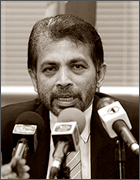CB chief pleased with positive trends in money flow
by Peter WONACOTT
|

Ajith Nivard Cabraal
|
|

Dr. Palitha Kohona |
COLOMBO, Sri Lanka - The end to a long war has come just in time for
Sri Lanka’s economy, according to the country’s Central Bank chief, who
is now taking steps to lift low foreign-exchange reserves and spur
growth.
“For 30 years, whenever investors spoke of Sri Lanka, the refrain
was, `If only it wasn’t for the war,” said the Governor of the Central
Bank of Sri Lanka Ajith Nivard Cabraal in an interview. “Today, it’s not
the next word. A huge change has taken place.”
The change is clear from foreign capital inflows in the wake of the
Tamil Tigers’ defeat. Since the Sri Lankan army killed the top
leadership of the Tamil Tigers early last week, the stock market has
soared and foreign funds have flocked to government securities.
About $100 million in Sri Lankan Government bonds were purchased in
the five-day period ended Wednesday, the Central Bank chief said.
The result is that Sri Lanka is edging back from an economic crisis,
brought on by the global turmoil and the strains of trying to squash the
Tigers’ separatist insurgency.
At the end of March, Sri Lanka’s foreign exchange reserves had
dwindled to about $1.3 billion. The paltry amount - covering a little
more than a month of imports - forced the government to turn to the
International Monetary Fund for assistance.
Some IMF members, including the U.S. have expressed reservations
about extending another emergency loan, this time for $1.9 billion, to a
country that has come under fire from aid agencies and human rights
groups.
The United Nations estimates more than 7,000 civilians have died
since the start of the year; about 300,000 war refugees are now confined
to camps with no certain date for their release. Since fighting began in
1983, about 100,000 people are estimated to have been killed.
But demands by Western countries and human rights groups for an
inquiry into alleged war crimes by the government were derailed this
week.
A special session of the U.N. Human Rights Council in Geneva praised
the government for freeing thousands of hostages held by the Tamil
Tigers in the last days of the war.
Flipping through an IMF booklet on borrowing, Sri Lanka’s top banking
official argues that lending decisions should be divorced from politics.
Sri Lanka has borrowed from the IMF 19 times in the past 25 years of the
conflict, he says, adding: “I can’t see the IMF changing course now that
the war is ending.”
Last week, an IMF spokeswoman said the institution was at an
“advanced stage” in discussions for the current loan request.
To try to assuage critics of the Tamil offensive, and to promote the
country’s economic prospects, Cabraal said officials will begin next
week travelling to cities in Asia, Europe, the U.S. and the Middle East
to meet with foreign investors. “We think it’s important to clear the
air,” he said.
Foreign capital is crucial to Sri Lanka’s effort to revive its
economy, which is based on tea, textiles and tourism. But with Western
nations questioning the government’s conduct in the war, Sri Lanka had
to turn to other allies for aid. Iran has pledged $1.9 billion in
development assistance, and China’s aid has topped $1 billion, says Sri
Lanka’s Foreign Secretary, Dr. Palitha Kohona.
“Sri Lanka, confronted with the choice of economic blackmail or
finding an accommodation with terrorism, had to strengthen its ties with
alternative partners,” Dr. Kohona said in a speech last week. The
Government wants to begin rebuilding its war-torn north, including roads
connecting it to the south and east.
Next week, the government plans to roll out a special low-interest
loan program to assist farmers, fishermen and small businessmen in the
north.
The region’s revival, though, may depend on how quickly the hundreds
of thousands of predominantly ethnic Tamils are released from camps and
able to rejoin the economic mainstream.
“There is no way to develop a region depopulated of people,” a
Western diplomat said.
In a report Wednesday, Citigroup Global Markets recommended buying
Sri Lankan treasury bonds on prospects that peace will improve political
stability, reduce defense spending and spur foreign capital inflows.
“The end of the domestic conflict between the military and the Tamil
Tigers marks a milestone from a political and economic standpoint,” the
Bank said in its report.
The economy wasn’t expected to grow more than 3% this year, after
averaging 6% growth over the past four years, according to the Central
Bank chief.
But now that the global economy is showing signs of coming out of its
slump, he said, the government may raise that forecast a couple of
percentage points.
“The war’s ending and the global economy is recovering,” Cabraal
said. “That’s a powerful combination.”
|

